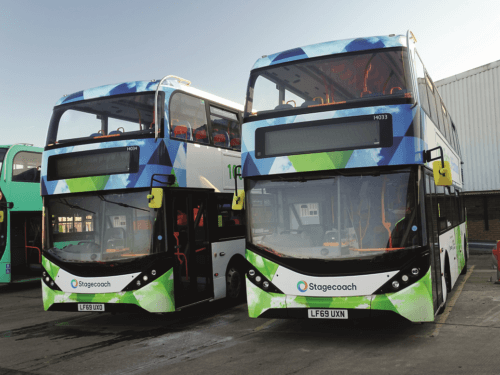
Stagecoach plans to increase the number of electric buses in its fleets from 184 to 343 in the next 12 months
Stagecoach has confirmed that it is planning to increase its electric bus fleet by over 80% in the next 12 months as it continues its journey towards being a net zero business. The operator has published a new report outlining its progress in 2021-2022 against the business strategy it launched in 2021, ‘Driving Net Zero: Better Places to Live and Work.’ The report details a programme of improvements delivered in the last year against its planet, people, prosperity and governance targets. It includes a package of capital investment in new cleaner buses, measures to improve energy efficiency as well as improvements and investment for Stagecoach employees and local communities.
Stagecoach is continuing with its plans to target a zero-emission UK bus fleet by 2035, and has already introduced electric buses in many of its operations, including one of Europe’s biggest investment in e-buses in Manchester. As part of these plans, the company will be increasing its electric bus fleet from 184 buses to 343 in the next year, an increase of 86%. It will also be launching the first all-electric city bus networks in the UK in Inverness and Perth in 2023.
Key highlights during 2021-2022 include the introduction of 75 new zero-emission buses across the UK, with 79 new e-buses in London during 2021-222; 10 new hydrogen buses due to enter service in Liverpool in spring 2023; an overall 32% reduction in scope 1 & 2 CO2e emissions per passenger journey; introducing 100% renewable electricity across the business, with new energy saving lighting in place in some locations; recycling mobile devices, which has helped to fund the planting of over 3,000 trees; and the opening of a sustainable new depot in Cwmbran in South Wales, which features a water recycling system, electric charging bays, intelligent heating, solar panels and a grass roof for rainwater harvesting.
Furthermore, the company has become one of the first bus operators to introduce low bridge alert technology across its entire fleet of double-deck buses, has put in place new employee networks as part of its diversity and inclusion plans, and launched a ‘Giving for Good’ initiative to support charities and community causes.
Greg Ritt, Head of Sustainability at Stagecoach, said: “We know there is still a lot of work to be done, but we’re pleased to have had a really good year of progress against our sustainability strategy. Despite the challenging macro-economic environment, and the specific pressures that are being faced in the public transport sector, as the country’s biggest bus and coach operator, Stagecoach is continuing to play a leading role in decarbonising the sector and we are working hard towards our target to become a net zero business by 2050.
“Our services are critical to rebuilding the country’s economy and levelling up communities. As well as the steps we are taking to decarbonise our own business, it is equally as important for national and local government and transport operators to work together to maximise the benefits of the bus to meet the country’s aspirations of a net zero future.”

